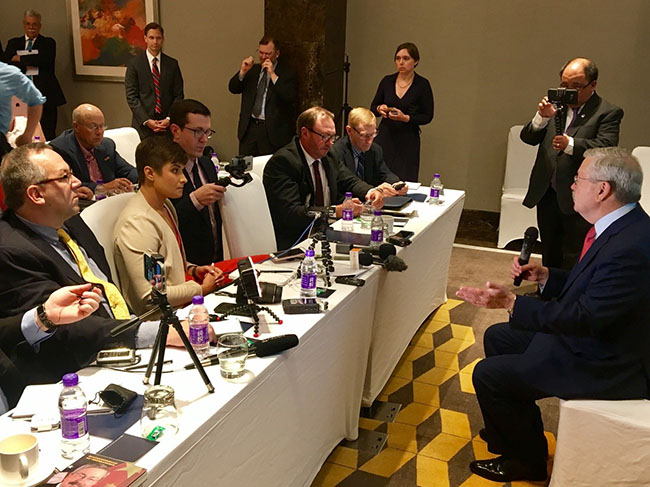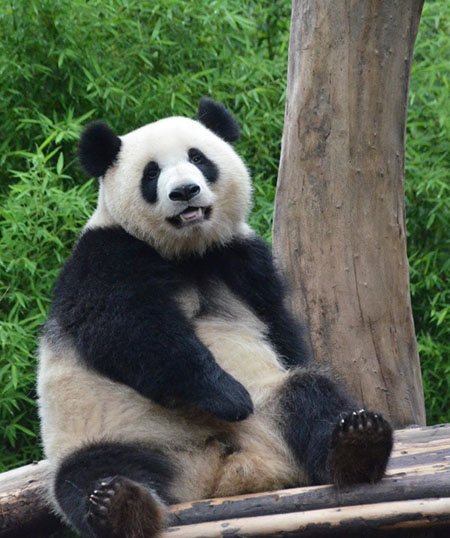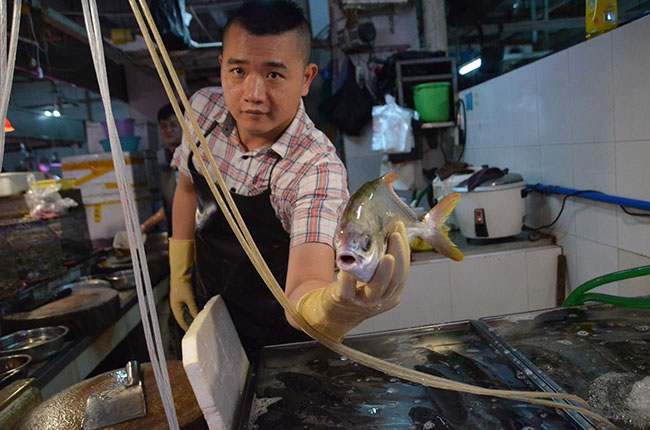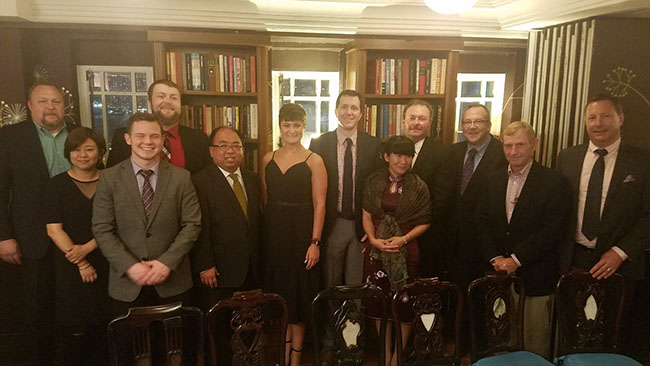Five broadcasters who traveled recently with the NAFB delegation to China offered their reactions and photos. Featured are highlights reported by Monte James, Shannon Yokley, Steve Bridge, David Geiger, and Spencer Chase. U.S. Ambassador to China Terry Branstad briefed broadcasters during their time in Beijing. The briefing was across the street from the U.S. Embassy at the Hilton hotel for logistical reasons and so broadcasters could access their recording equipment. The NAFB trip started June 21, and broadcasters returned on July 4.

By Monte James (Your Ag Network, Inc., Yankton, SD)
Being a team member of the NAFB Journey to China will always be one of the highlights of my career, and life, as well. The fact the U.S. and China’s tariff/trade war escalated to a head during our time there made it all the more memorable as a broadcaster. I can honestly say I’ve never had the opportunity to be on the front lines of such an historical event. My expectations of China were very minimal, to say the least, going in. I anticipated it to be a country with high crime and poverty but rich in rules and restrictions. Instead, I found it to be a charming and stunningly beautiful land steeped in tradition and diverse culture. We had the opportunity to hear personal experiences from our two full-time tour guides as well as individual hosts and hostesses from the five cities that we visited. I was shocked by the honest and extremely personal stories they shared with us involving topics like: growing up in times of famine, bound feet, and the radical “urbanization” of China’s vast rural areas. Never during our two weeks touring China by “bullet-train,” bus, and plane did I feel the least bit threatened or gawked at, or that anyone was trying to restrict our movements or reporting. On the contrary, I felt that the people were eager to share with us. We had numerous grinning children come up to our group on the train ride between Xi’an and Chengdu and offer us gifts of pumpkin seeds and hard candy in exchange for a simple high-five. They wanted nothing in return, which was refreshing. I found myself drifting away from the group tours and wandering off into the night to mingle with people on the streets and shops in the areas around our hotel. Again, I never felt in danger nor did I feel anger from people regarding the ongoing trade issues between our two super-power countries. I felt nothing but kindness and a great pride in their country. I tip my hat to Custom Travel Network and NAFB for organizing such an educational and splendid tour! Some of my broadcasting highlights included interviewing Ambassador Branstad, seeing the barges come in from across the world to the port of Guangzhou, and the jaw-dropping “wet-market.” On a personal level, visiting the Terra Cotta Army in Xi’an has been a lifetime goal and dream come true. The quality of hotels and travel companions also were off the charts (in a good way). I can honestly say that this tour has not only changed my perspective about China but it also has solidified my belief that there are good people all across the planet. I hope I have conveyed that to our network listeners since arriving back from this most memorable of journeys.
By Shannon Yokley (Brownfield Network, Jefferson City, MO)
 The 13-hour international airline flight in a middle seat seemed luxurious just knowing I was on my way to China. I had looked forward to the NAFB trip for many months. Months (and even days) before our trip, I really had no idea what to expect. I studied abroad in college, so I had experience with travelling internationally, but that was really all the context I had. I also didn’t have any experience with obtaining a visa, so that was also very interesting and a learning experience. I planned on travelling with an open mind, open eyes, and open heart. I tried not to have preconceptions because I believe you are better able to enjoy the present. The thing that impressed me the most about China was the size of their population and how their daily routines worked. Due to the lack of car permits, many people commuted by using scooters and bikes – often with multiple people on them. Also, traffic lanes seemed to not exist so how people stayed
The 13-hour international airline flight in a middle seat seemed luxurious just knowing I was on my way to China. I had looked forward to the NAFB trip for many months. Months (and even days) before our trip, I really had no idea what to expect. I studied abroad in college, so I had experience with travelling internationally, but that was really all the context I had. I also didn’t have any experience with obtaining a visa, so that was also very interesting and a learning experience. I planned on travelling with an open mind, open eyes, and open heart. I tried not to have preconceptions because I believe you are better able to enjoy the present. The thing that impressed me the most about China was the size of their population and how their daily routines worked. Due to the lack of car permits, many people commuted by using scooters and bikes – often with multiple people on them. Also, traffic lanes seemed to not exist so how people stayed  safe and traveled carefully amazed me. In addition to traffic safety, another thing that I found interesting was their food and health safety. We visited a wet market in Guangzhou where people would handle all kinds of food (both live and harvested) and sometimes not purchase the meat or product. I thought so many times to myself that this would never fly in the U.S. But, I also found attractiveness in it – getting to choose your own fresh dinner, barter a good price for it and enjoy it however you would like it prepared. However, I sure appreciate the safe, wholesome, and affordable sources of food we have in the U.S. more. My favorite experience was climbing as far as we could go on the Great Wall. It was everything I had imagined it to be but also so much cooler in-person. I am amazed by the sacrifice and toil that went into building it and how it is still enjoyed and appreciated globally so many years later. I also really enjoyed the Chengdu Research Base of Giant Panda breeding. It was so neat to see how they revered each panda, and you can tell they each had their own personality. Lastly, the most important and cool experience for me was sitting in front of U.S. Ambassador Terry Branstad during our meeting with him, learning about our
safe and traveled carefully amazed me. In addition to traffic safety, another thing that I found interesting was their food and health safety. We visited a wet market in Guangzhou where people would handle all kinds of food (both live and harvested) and sometimes not purchase the meat or product. I thought so many times to myself that this would never fly in the U.S. But, I also found attractiveness in it – getting to choose your own fresh dinner, barter a good price for it and enjoy it however you would like it prepared. However, I sure appreciate the safe, wholesome, and affordable sources of food we have in the U.S. more. My favorite experience was climbing as far as we could go on the Great Wall. It was everything I had imagined it to be but also so much cooler in-person. I am amazed by the sacrifice and toil that went into building it and how it is still enjoyed and appreciated globally so many years later. I also really enjoyed the Chengdu Research Base of Giant Panda breeding. It was so neat to see how they revered each panda, and you can tell they each had their own personality. Lastly, the most important and cool experience for me was sitting in front of U.S. Ambassador Terry Branstad during our meeting with him, learning about our  relationship with China and how tariffs and other current topics will affect that. This trip was an extraordinary opportunity, especially with all the changes in today’s world and especially for us in agriculture. This trip has provided me with a better understanding of the importance of trade and international relations. It also often reminded me how fortunate we are in the U.S to have access to the things we do: free speech, social media, housing availability, and all the freedoms we practice daily. Traveling provides you with many gifts, but perhaps the biggest return is that it reminds you to be thankful for everything you have.
relationship with China and how tariffs and other current topics will affect that. This trip was an extraordinary opportunity, especially with all the changes in today’s world and especially for us in agriculture. This trip has provided me with a better understanding of the importance of trade and international relations. It also often reminded me how fortunate we are in the U.S to have access to the things we do: free speech, social media, housing availability, and all the freedoms we practice daily. Traveling provides you with many gifts, but perhaps the biggest return is that it reminds you to be thankful for everything you have.
By David Geiger (Agribusiness Association of Iowa, Des Moines, IA)

In a wet market of Guangzhou, China, men and women line up in front of stalls selling fresh food. Architecture and electricity aside, this market is unchanged from ancient dynasties. Fish floating in a bubbling container are knocked out and sliced up within 30 seconds. A Chinese woman pointing out the fish she wants tosses her yuan (money) onto a table wet with guts and cleaning water. The cut is folded into a bag and handed over, the yuan put into a hanging basket to dry. Across the way, another vendor smacks a turtle with a butcher knife; his coworker points to a frog in a basket, trying to make a deal. These Chinese customers believe in seeing a whole animal, gauging its freshness, and buying their meals daily. Several miles away, there is a mall; nicer, perhaps, than many in the United States. Tucked away behind designer clothing stores is a supermarket named Ole’. It is the average size of a supermarket in the U.S. and has double the employees handing out samples or working the registers. Neatly packaged food products line the stocked shelves as customers march past with shopping carts. But unlike the United States, some of the products proudly declare they are made in America. Many Chinese place these products in their baskets, expecting a safe and quality food. Another benefit is all the packaged, boxed, or canned foods can last much longer—a modern way of filling a home with food for those who can afford it. In a restaurant, American tourists sit at round tables with Lazy Susans. Waiters pile these turntables high with dishes of food. Dumplings, vegetables, noodles, and rice are pushed around and around as hungry customers snatch with chopsticks or ladle with spoons. This restaurant has a special dish to serve, however: American beef tri-tip served with peppers and onions. Before the table makes a full turn, the beef has disappeared. Another plate of tender, well-cooked beef is ordered. Soon the Americans have their fill. This beef has only recently returned to the market after 13 years of government bans. Since society developed to delegate tasks, markets have existed to feed those who no longer grow food. Those markets have since evolved. For incomes that exceed daily allowance, customers may buy packaged goods to feed families for weeks. Modern globalized agriculture allows states to package and produce food to feed countries and, in turn, those countries can mobilize manufacturing or service-based economies. The future builds on these markets through trade. Fair and equal partnerships can present opportunities for agriculture to move from feeding some countries to feeding every country. Whether you are a citizen or tourist in a wet market, a grocery store, or restaurant, abundant food is available. The future is upon us.
By Steve Bridge (WFMB, Springfield, IL and TV interviewer, This Week in Agribusiness)
Before our trip, China represented a monolithic name in the news to me. It stood for a faraway place that I only viewed as a single entity. But, traveling there, I quickly realized it’s not that simple. Seeing a fraction of the 1.4 billion people who live there, work there, and believe in that system, it leaves you wondering just what you really know about the place. But it also affords you the perspective that we better learn more about them. As the world continues to transform and flatten, we can’t be left behind. I had to look up some of the places we were headed to in China. What I found was, we were going to many cities I had never heard of. However, they were all bigger than New York or Chicago. It quickly became apparent that in China, a city of 20 million can slip under your nose. The country is set to hyper-drive. It’s easy to feel that way when you look out the window of a train and see the countryside move past you at 180 miles an hour.
But it’s the people anywhere that make a place what it is. And it’s those stories that I think best showcase where China has been and where it’s going. Helen was our tour guide in Beijing. It’s a modern, vibrant place; and as our time wrapped up with her, I pulled Helen aside. I told her this place looks nothing like the vision I had of a communist state. How did those who lived here feel about the government, did they feel oppressed, were they missing out not living in a free society? Helen told me they like to think what they have as the “Chinese style,” a communist rule that’s been altered and crafted to be better. True or not, it’s how she felt. And she also said quite simply, things are so much better now than they were a generation or two ago that there is little to complain about. We may see their system and shake our heads and wonder how they live without Facebook. They have so much more than could have been imagined a few decades ago, so they are willing to live in the moment. But there is another generation coming and will they be so ready to just accept things? One of the greatest joys of the trip was taking a minute and interacting with young Chinese kids. You’d see them out of the corner of your eye, looking at you, and all it took was a quick smile and they wanted to practice their English and take a selfie with you. Once, I spent 15 minutes on a train smiling at and talking to a pair of 12-year-olds, Jerry and Linda. Their effortless curiosity will be hard to contain over future generations. We know China will need soybeans. We know they will take all the chicken feet we can send them. And they will more than likely begin to get a taste for U.S. beef, too. Trade tariffs will more than likely be resolved and goods will flow again – too much is at stake. But it won’t be a tariff that changes China or the U.S., it will be those kids on that bullet train that push for change in China. Those are the stories to watch.
By Spencer Chase (Agri-Pulse Communications, Alexandria, VA)
Having never been to China, I wasn’t sure what to expect during my travels there. I knew the country was a major player for U.S. agriculture exports, but seeing the massive scale necessary to house, feed, and transport almost 1.4 billion people was absolutely staggering. But as massive as China is, it also was noteworthy how far they have to go in a few areas. They are constantly building out new infrastructure, including new ports and grain-handling facilities, which is a necessary because we saw more than one loading or unloading operation using a clam shell-style mechanism rather than an auger to move the grain. A tour guide also told us the construction methods over there can lead to a 30-story building being built in 70 days. Things like that lead me to really wonder what the future holds for China. Will the country realize in 30 years that its roads, bridges, and housing developments built during this decade were woefully underbuilt in their haste, or are they able to still create structurally sound infrastructure in such a short period of time? As the country works to move its small farmers into cities, will its plan to mechanize the ag production that used to happen on those small plots pan out? I’m also interested to see how the economic system in China will hold up over the years. Our tour guides would discuss the average expenses and average income for citizens in a given city, and the numbers never seemed to add up. But at the same time, there was a pretty obvious admiration for Xi Jinping and a loyalty to the government, so will the people there ever decide things could get better? One of the biggest questions I have about China now is what happens in the very near future. The consumers there seemed happy with U.S. ag products, but how long will those memories last if the U.S.-China tariff battle lags on? A friend who works in the ag industry in Washington, D.C., joked to me after I returned: “What did they say to you when you left? ‘Here’s this huge market, hope you enjoyed it, because you’ll never see it again!’”

(far left), their country guide, interpreter, and tour coordinator.
